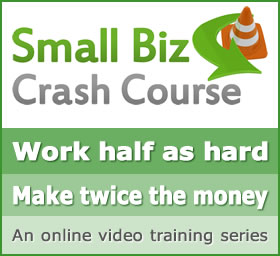By Dawn Fotopulos.
I have a friend named George. He asks me to dinner once a year and the conversation always has the same ring to it.
George has a great new idea. He wants to test it because he thinks it will make him a lot of money. It’s in an area where he has little experience, but it has high revenue potential…or so he thinks. These business ideas have ranged from premium production in China all the way to retail security systems.
It’s been four years and he’s still at square one.
I know a lot of people who feel like George. They have great ideas, but don’t have a concrete strategy to pull them off.
Startup strategy is all about finding the business that’s right FOR YOU. The truth is, all these businesses George brought up can all be profitable. It’s not that they’re bad ideas. The problem is that George has zero, zip, nada experience in any of them.
He would have to climb a very steep learning curve in all of these industries if he’s going to make real money (over $100,000 in salary). To make over $100,000 every year means his business should probably be making at least $1,000,000 in revenues. This is no small task.
If you have no idea what any of that means, watch our instructional videos on the Profit and Loss Statement in our Learn section. Revenues are top line. Profits are bottom line. There’s a big, fat, world of expenses between the two.
The best strategy for George is for him to leverage the experience he already has in industries he knows. Why? Because his risk of failure will be far lower. He’s already made his mistakes in those industries while working for someone else. George’s experience gives him competitive advantage over his peers who are just getting started.
One of the key questions any investor or bank will always ask you before they loan you money is: “How much experience do you have in this business?”
If you have a lot of experience in an industry, even if you were working for someone else, that makes you a better credit risk. It also means you have a ready network of industry experts, suppliers, customers, industry knowledge, media contacts, web traffic that probably took years to build. If you have experience generating revenues especially in your former job, that counts even more. Why? Because revenues drive EVERYTHING.
Ewing Marion Kauffman worked for a pharmaceutical company in the 1930′s as a sales rep. He made no salary, only commission. He was the top salesperson in the firm, making more than the president of the company. After they tried to cut Mr. Kauffman’s salary for the second time, he decided he’d had enough and struck out on his own. He took some of his customers with him (which is not illegal unless you’ve signed a non-compete). Kauffman made money his first year in business. Forty years later, he sold Marion Labs to Dow Chemical for over a billion dollars.
How did Kauffman do it? He followed three specific guidelines:
1. Simplify your life to what you do best.
2. Focus your efforts on the highest potential customers.
3. Leverage your network of people who know and trust you.
Check back tomorrow for some advice on how to apply those three principles to real decisions!
This post is part of a series on How to Start Your Own Business. Click here to read Part 2 of this article!


